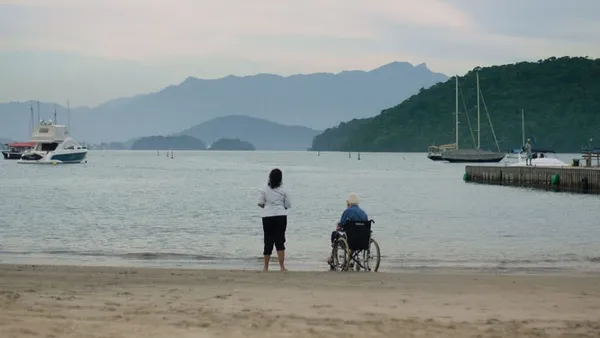Eye For Film >> Movies >> Three Summers (2019) Film Review
Three Summers
Reviewed by: Jennie Kermode

They called it Operation Car Wash. It began in Brazil in 2014 and over the next five years it saw more than 1,000 warrants issued across at least a dozen countries, with those arrested even including the former presidents Fernando Collor de Mello, Michel Temer and Luiz Inácio Lula da Silva. Although many of the charges didn’t stick, it was still warmly welcomed by a people sick of corruption and profiteering among the super rich. The problem was that that wealthy elite had a lot of ordinary people depending on it. Little thought was given to what would become of them when their livelihoods were abruptly taken away.
In addressing this crisis, it’s all too easy to end up portraying the Brazilian lower classes as by nature weak and vulnerable, so it comes as a relief that Sandra Kogut’s dark comedy drama revolves around a character who is anything but. Madá (Regina Casé) is a housekeeper of the old school, the kind who, though kindly and good humoured in her way, terrifies other servants and rich people’s children, with even her employers herself seeming wary of stepping out of line in her domain. They value her because that force of personality comes with a formidable ability to get things done, to solve almost any problem thrown at her and to run the household in their absence – which is most of the time, since they only go there for summer holidays. There’s also a sense that her toughness means they can think of her on some level as an equal, a person with whom it’s possible for them to have a friendly relationship, and more easily ignore the glaring economic injustice that keeps her trapped in this role when for years she has dreamed of starting her own business.

We meet Madá first in 2015, when she’s organising the family’s Christmas celebrations and trying to talk her employer, Edgar (Otávio Müller) out of the money she needs to secure her business premises, whilst selling her culinary creations out of the kitchen on the sly. The following summer, Edgar is in deep trouble; his wife Marta (Gisele Fróes) is hiding out in Europe with their son, and Madá has been left to take care of his elderly father, Lira (Rogério Fróes). Nobody is getting paid but she feels unable to abandon the old man and she has nowhere else to go, whilst the other servants look to her for leadership. She’s not without ideas and her various schemes form the meat of the film. By the third summer, she’s renting out part of the property to holidaymakers and running boat tours of the surrounding region, pointing out different houses and explaining what their owners have been arrested for.
Madá’s entrepreneurial spirit and take-no-prisoners attitude make her an entertaining central character but Kogut doesn’t lose sight of the ugliness underlying the situation. In one scene our heroine is presented with cast-off designer clothes as if she’s supposed to be grateful for the chance to wear what others no longer want. In another, she recounts a story about her past which highlights the difference between poverty as people imagine it and poverty as it really is, whilst giving former soap opera star Casé the opportunity to show what she’s capable of.
Despite the solid central performance, the film’s meandering storyline and tendency to let scenes drag on too long means it has a fair number of weak spots. It would really have benefited from tighter editing. For all that it has to say about class tensions, the highlight is the relationship between Madá and Lira, with the two characters, both of whom have endured painful disappointments in their personal lives, finding a connection that bypasses all that and speaks to something more fundamentally human. It’s here, where hope seems thinnest on the ground, that the film manages to do something more than joking and sniping. Like Madá’s dream of owning a little roadside kiosk, it hints at the possibility of a different way of life.
Full of entertaining moments but overindulgent weighed down by its own ambition, Three Summers isn’t as good as it should have been but is still one of the best cinematic commentaries on the Brazilian corruption scandal to date.
Reviewed on: 29 Mar 2020

















